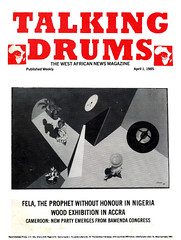Problems confronting minorities in American education (Part 1)
Dorothy V. Smith
From time immemorial, students from Africa and other parts of the so-called Third World have made it a sacrificial point of leaving their respective countries for the United States and other advanced nations in search of the proverbial golden fleece. Some of these students, as minorities in host countries, often face insurmountable problems. Unfortunately, however, most of the problems are not known to these ambitious students before they embark on their sojourn abroad. In this article, Professor Dorothy V. Smith of the History Department of Dillard University in New Orleans, Louisiana, USA, spells out some of the numerous problems which often confront minority students, including Africans, in American higher education.In America, students are filled with excitement when they enter graduate school and, very often, they look forward to the challenging as well as the stimulating years which lie ahead. In the end, hard-working students see the apex of their efforts culminating in the eventual receipt of the academic degree for which they have toiled.
Indeed, while graduate school is usually demanding for all those who remain there until the end, problems become compounded if one happens to belong to a non-traditional part of society, especially so if one is either an African, a Black or, above all, a female of colour.
As an academic year commences, ambitious students exhibit a measure of jubilation about their current academic and professional pursuits which, invariably, include the efforts of getting to know fellow classmates, new professors, and their fields of study. In most instances, both the familiarization and assimilation processes do not take long because, during the first few class meetings, non-traditional students are instantly shocked into white reality, and the situation becomes much more acute if they are in predominantly white- populated institutions. Consequently, they tend to realize that the university they had envisioned as an outlet for creative thinking as well as a place for the mutual exchange of ideas is suddenly transformed into an enigma of conservatism and racism.
Indeed, while the active recruitment of non-traditional students to enter graduate programmes is one issue, their treatment upon arrival is quite another. To a great extent, one has to be prepared to meet and accept these unforeseen challenges socially, emotionally, and academically, although in most instances the academic aspect ends up being the easiest part of the absorption process.
Undeniably, most of the non- mainstream students have to be ready to accept institutional racism, and, in the circumstances of female students, sexist statements throughout their stay. Certainly, it could be argued that the academic arena is an area where minority students can have a critical impact in reversing myths and stereotypes, although the reality of it may be limited.
Surely, the most blatant and absurd statements are challenged, by very ambitious and sensitive students, but if all such statements are to be addressed during each class period, then the entire study-period would be devoted to that topic. Interestingly, the non-traditional students soon realize that they are being labelled by their peers and professors as being either racist or overly sensitive to certain issues.
It is also an undeniable fact that minority male's problem is often compounded by the fact that minority males are sought by women in general, a situation which greatly diminishes the possibility of a date for the non-traditional women
As a result, they often begin to shy away, from the academic discussions, thus offering the impression that something is either wrong with an individual's ideology, or that the individual is anti-social, per se. This obviously becomes a perfect rationale for some unfriendly and intimidating professors to justify their actions.
In view of the foregoing, the issue of an individual student's self evaluation is of paramount importance for several reasons, including good self-esteem and job placement upon graduation. For the non-traditional and alienated students, however, they are usually perceived as being less qualified than the rest of the students. Consequently, the final grades of such students are manipulated by some professors to reflect these attitudes.
It is a fact that some of the minority students in graduate school, just like some of their majority counterparts, do have special problems which have to be addressed. Nevertheless, many of such students are quickly able to overcome the fear ког the large university, the isolation of the student body, and apprehension about competition. Yet, some unscrupulously biased professors do not make the efforts to get over their fears and suspicions easily.
Sadly enough, minority students are constantly deemed to have real and imaginary problems, the two most common of which they are saddled with are impaired conceptualization and limited writing abilities. Very often, too, some professors exhibit total alienation from non-traditional students and, in converse situations whereby particular minority students are able to express themselves very well orally and in writing, it becomes an intimidation for such professors.
Whenever the obviously biased professor "objectively" evaluates his class, including the special minority students, he often concludes that they deserve only average grades. This even occurs with so-called liberal professors who, sometimes, have had cause to praise the work of their minority students to the entire class. The end- result is that, somehow, even such a professor is not able to resolve the inherent bias in order to assign the earned grade.
In many instances, weak-minded or brainwashed minority students often become belligerent, withdrawn and, in the end, they are pushed out of school because of marginal grades. Very often, these students do not understand that the unpronounced goal of the professors is invariable to try to absorb them mentally into the mainstream of white American thinking and way of life, by making them feel as if they are inferior and incapable of grasping the necessary rudiments of their studies for the completion of the assigned academic programme. In numerous instances, minority students fall by the wayside because of a transparent lack of empathy and negative approach to a sensitive moral issue.
